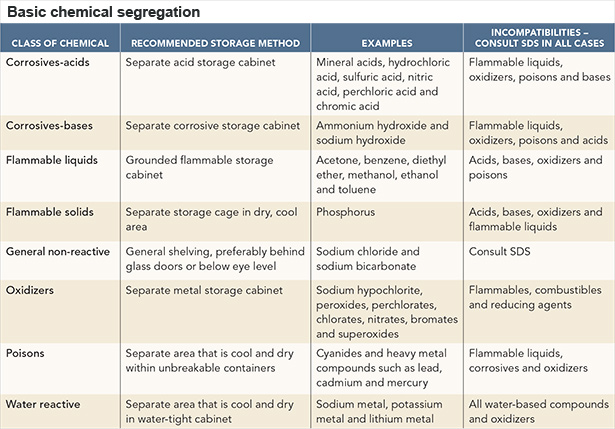Chemical storage
What are some common chemical storage compatibilities?
Responding is Wes Maertz, CSP, technical safety specialist, Grainger, Lake Forest, IL.
Chemicals have become a part of our lives, but we often forget that they can be harmful if not stored properly. It has been estimated that approximately 1,000 new chemicals come onto the market every year, according to an International Labour Organization article from 2004. These chemicals are usually found as mixtures in commercial products. In fact, 1 million to 2 million such products or trade names exist in most industrialized countries. The inherent hazards of so many substances can be reduced by minimizing the quantity of chemicals on hand. However, when chemicals must be in-house, proper storage is essential to help reduce or even eliminate the associated risks.
Storing chemicals in the workplace may seem basic, but there is more to it than placing chemicals into a storage cabinet and walking away. Chemicals cannot simply be stored in alphabetical or numerical order; they must be segregated and stored based on their compatibility. Fire, explosion and the formation of toxic gas are some of the undesirable consequences when incompatible chemicals collide.
Proper storage information usually can be obtained from the Safety Data Sheet, label or other chemical reference material. As required by 29 CFR 1910.1200, an SDS must be on hand for every chemical in the workplace. The SDS and chemical label can be consulted for information on special storage requirements. For some, a physical barrier and/or distance is effective for proper segregation. If cabinets are used to separate chemicals, consider the compatibility of the chemicals within the cabinet.

Editor's note: This article represents the independent views of the author and should not be construed as a National Safety Council endorsement.
Post a comment to this article
Safety+Health welcomes comments that promote respectful dialogue. Please stay on topic. Comments that contain personal attacks, profanity or abusive language – or those aggressively promoting products or services – will be removed. We reserve the right to determine which comments violate our comment policy. (Anonymous comments are welcome; merely skip the “name” field in the comment box. An email address is required but will not be included with your comment.)

